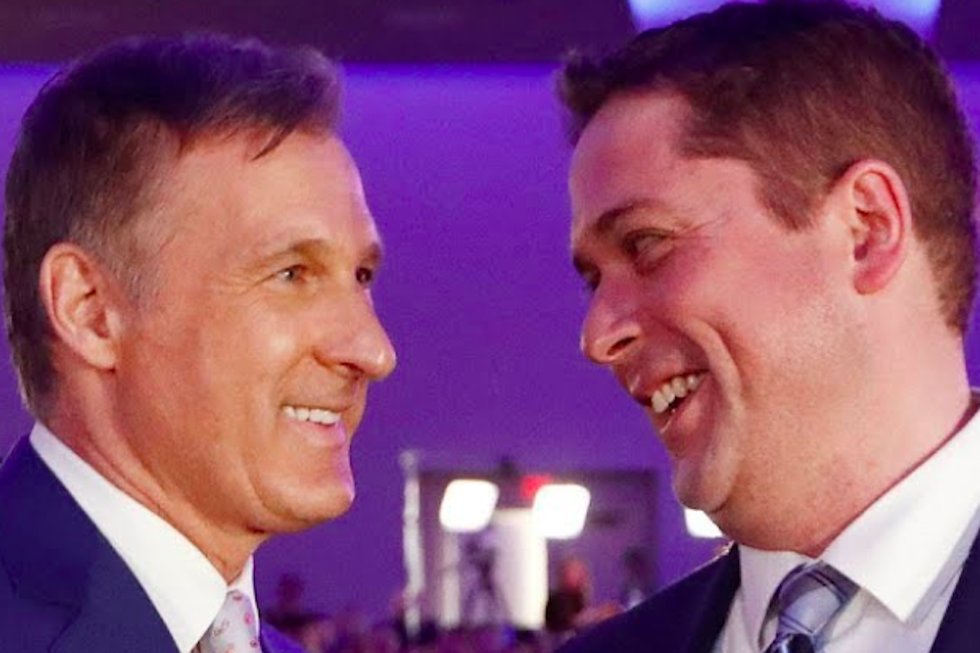
Maxime Bernier has had numerous forays – and failures – as a politician.
But his most recent, vying to be prime minister under the banner of the People’s Party of Canada (PPC), is shaping up to be the most humiliating of all – and not just for Bernier, but Andrew Scheer, the man to whom Bernier narrowly lost the Conservative Party leadership in 2017.
In order to understand Bernier’s politics, it’s essential to understand what led up to the creation of the PPC and his bid to lead the country.
Bernier was a failed separatist from Quebec who later became a Conservative MP under former Prime Minister Stephen Harper. He was appointed the Minister of Foreign Affairs but was forced to resign after leaving confidential documents in his then-girlfriend’s house.
His loss to Scheer – on the last ballot and by less than one per cent – was supposed to result in a tell-all book about his leadership campaign. He blamed “fake Conservatives” for his loss and was ultimately forced to halt publication.
As a result, Bernier was booted from Scheer’s shadow cabinet. Having fallen so far, Bernier decided to take a page out of U.S. President Donald Trump’s book of attention-grabbing tactics – right down to hateful and divisive tweets.
In true Trump fashion, Bernier has attacked both immigration and multiculturalism. He’s accused Liberal Prime Minister Justin Trudeau of “extreme multiculturalism” and creating a “cult of diversity” that would “divide us into little tribes.” He’s also accused some cultures of wanting to live in “ghettos.”
He has not pointed to evidence to back up his claims, but seems to rely exclusively on hateful stereotypes often promoted by Trump stateside.
Bernier’s recent tweets about 16-year-old environmental activist Greta Thunberg were some of his worst to date. In addition to denying that there is a climate emergency, he viciously called Thunberg “mentally unstable” and “not only autistic but obsessive-compulsive.”
Bernier’s diatribes are not just reactionary and hateful toward immigrants and people from different cultures he’s also targeted Indigenous peoples in his Twitter rants.
For example, Bernier has criticized the Trudeau government’s plan to create a statutory holiday to remember the many human rights abuses visited upon Indigenous children forced to attend residential schools. He characterized the notion of a commemoration as “another sick characteristic of extreme PC [political correctness] and multiculturalism” and blamed a “cult of victimhood and obsession with past wrongs.”
More recently, Bernier denied the findings of the National Inquiry into Murdered and Missing Indigenous Women and Girls of historic and ongoing genocide on the part of Canadian governments in the deaths of thousands of Indigenous women and girls.
Bernier’s positions serve as an important red flag in this election for those considering voting for Scheer, who also denies genocide occurred. On this issue and many others, the two are very much alike.
In fact, there is more in common between the PPC and CPC than just their logos and colours.
Scheer, too, shies away from talk of a climate emergency. He spent the day dedicated to the Global Climate Strike promoting his plans for wider roads and tunnel projects that would increase traffic.
Scheer has stated that bigots, extremists and racists are not welcome in his party, but he has stood by a number of candidates who have made racist and homophobic comments.
While Scheer may not be wearing the Make Canada Great Again hat seen during Bernier’s visit to western Canada, both spoke at the United We Roll event organized by the extremist Yellow Vests Canada in Ottawa earlier this year.
The only difference between Scheer and Bernier is that Bernier is a scorned former Conservative Party member and feels free to share his ultra-right-wing views.
Bernier barely lost to Scheer. He could have been the Conservative Party leader right now and we’d have less insight into his real policies.
We now know that the same people who voted for Bernier still remain largely within the Conservative party.
So while we may all breathe a sigh of relief that Bernier’s PPC will not form the next government, a vote for Scheer’s Conservatives is fundamentally a vote for many thousands who share Bernier’s divisive views.
Better to avoid that catastrophe now than suffer the devastating political chaos that has befallen Trump’s United States.
Pamela Palmater is a Mi’kmaw citizen member of Eel River Bar First Nation. She has been practising Indigenous law for 19 years and is currently an associate professor and the Chair in Indigenous Governance at Ryerson University.












